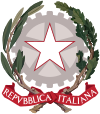Related Research Articles

The Italian Republican Party is a political party in Italy established in 1895, which makes it the oldest political party still active in the country. The PRI identifies with 19th-century classical radicalism, as well as Mazzinianism, and its modern incarnation is associated with liberalism, social liberalism, and centrism. The PRI has old roots and a long history that began with a left-wing position, being the heir of the Historical Far Left and claiming descent from the political thought of Giuseppe Mazzini and Giuseppe Garibaldi. With the rise of the Italian Communist Party and the Italian Socialist Party (PSI) to its left, it was associated with centre-left politics. The early PRI was also known for its anti-clerical, anti-monarchist, republican, and later anti-fascist stances. While maintaining those traits, during the second half of the 20th century the party moved towards the centre on the left–right political spectrum, becoming increasingly economically liberal.

The Italian Socialist Party was a social democratic and democratic socialist political party in Italy, whose history stretched for longer than a century, making it one of the longest-living parties of the country. Founded in Genoa in 1892, the PSI was from the beginning a big tent of Italy's political left and socialism, ranging from the revolutionary socialism of Andrea Costa to the Marxist-inspired reformist socialism of Filippo Turati and the anarchism of Anna Kuliscioff. Under Turati's leadership, the party was a frequent ally of the Italian Republican Party and the Italian Radical Party at the parliamentary level, while lately entering in dialogue with the remnants of the Historical Left and the Liberal Union during Giovanni Giolitti's governments to ensure representation for the labour movement and the working class. In the 1900s and 1910s, the PSI achieved significant electoral success, becoming Italy's first party in 1919 and during the country's Biennio Rosso in 1921, when it was victim of violent paramilitary activities from the far right, and was not able to move the country in the revolutionary direction it wanted.
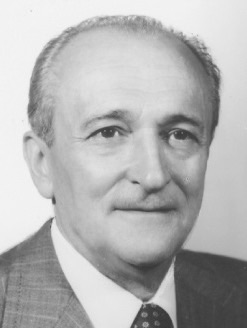
Alessandro Natta was an Italian politician and secretary of the Italian Communist Party (PCI) from 1984 to 1988. An illuminist, Jacobin, and communist, as he used to describe himself, Natta represented the political and cultural prototype of a PCI militant and party member for over fifty years of the Italian democratic-republican history. After joining the PCI in 1945, he was deputy from 1948 to 1992, a member of the PCI's central committee starting in 1956, was part of the direction from 1963 and of the secretariat, first from 1962 to 1970 and then from 1979 to 1983, and leader of the PCI parliamentary group from 1972 to 1979; he was also the director of Rinascita from 1970 to 1972. After 1991, he did not join the PCI's successor parties.

Pietro Sandro Nenni was an Italian socialist politician and statesman, the national secretary of the Italian Socialist Party (PSI) and senator for life since 1970. He was a recipient of the Lenin Peace Prize in 1951. He was one of the founders of the Italian Republic and a central figure of the Italian political left from the 1920s to the 1960s.
The Movement of Unitarian Communists, or simply Unitarian Communists, was a communist political party in Italy.

Migliorismo was a tendency within the Italian Communist Party (PCI). Its founder and first leader was Giorgio Amendola, and it counted among its members the likes of Gerardo Chiaromonte, Emanuele Macaluso, and Giorgio Napolitano. Napolitano went on to become the longest-serving and longest-lived president in the history of the Italian Republic, as well as the first president of Italy to have been a former PCI member. Due to the relatively moderate and reformist views of its adherents, it was referred to as the right-wing of the PCI. Apart from Amendola, Chiaromonte, Macaluso, and Napolitano, other notable miglioristi included Nilde Iotti, Giancarlo Pajetta, and Luciano Lama. After the death of Amendola in 1980, Napolitano became its main leader.
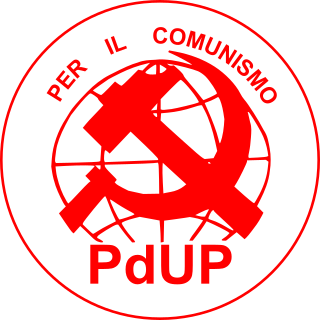
The Proletarian Unity Party was a far-left political party in Italy.

The 1968 Italian general election was held in Italy on 19 May 1968. The Christian Democracy (DC) remained stable around 38% of the votes. They were marked by a victory of the Communist Party (PCI) passing from 25% of 1963 to c. 30% at the Senate, where it presented jointly with the new Italian Socialist Party of Proletarian Unity (PSIUP), which included members of Socialist Party (PSI) which disagreed the latter's alliance with DC. PSIUP gained c. 4.5% at the Chamber. The Socialist Party and the Democratic Socialist Party (PSDI) presented together as the Unified PSI–PSDI, but gained c. 15%, far less than the sum of what the two parties had obtained separately in 1963.

The 1979 Italian general election was held in Italy on 3 June 1979. This election was called just a week before the European elections.

The Italian Democratic Socialist Party, also known as Italian Social Democratic Party, was a social-democratic political party in Italy. The longest serving partner in government for Christian Democracy, the PSDI was an important force in Italian politics, before the 1990s decline in votes and members. The party's founder and longstanding leader was Giuseppe Saragat, who served as President of the Italian Republic from 1964 to 1971. Compared to the like-minded Italian Socialist Party on the centre-left, it was more centrist, but it identified with the centre-left.
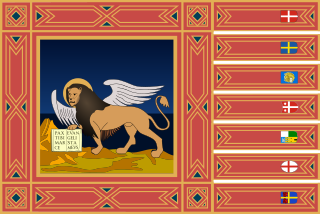
This page gathers the results of elections in Veneto.

The Legislature IV of Italy was the 4th legislature of the Italian Republic, and lasted from 16 May 1963 until 4 June 1968. Its composition was the one resulting from the general election of 28 April 1963.
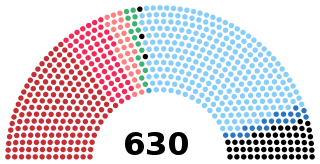
The Legislature VI of Italy was the 6th legislature of the Italian Republic, and lasted from 25 May 1972 until 4 July 1976. Its composition was the one resulting from the general election of 7 May 1972.

The Legislature VIII of Italy was the 8th legislature of the Italian Republic, and lasted from 20 June 1979 until 11 July 1983. Its composition was the one resulting from the general election of 3 June 1979.
The Pentapartito, commonly shortened to CAF, refers to the coalition government of five Italian political parties that formed between June 1981 and April 1991. The pro-European and Atlanticist coalition comprised the Christian Democracy (DC), the Italian Socialist Party (PSI), Italian Democratic Socialist Party (PSDI), Italian Liberal Party (PLI), and Italian Republican Party (PRI).

The Communist Refoundation Party is a communist political party in Italy that emerged from a split of the Italian Communist Party (PCI) in 1991. The party's secretary is Maurizio Acerbo, who replaced Paolo Ferrero in 2017. Armando Cossutta was the party's founder, while Fausto Bertinotti its longest-serving leader (1994–2008). The latter transformed the PRC from a traditional communist party into a collection of radical social movements.

Pietro Bucalossi was an Italian physician and politician. He is remembered for his cancer research, and his austerity and small government policies while Mayor of Milan in the 1960s.

Luigi Pintor was an Italian politician and journalist.
References
- ↑ "La Camera dei Deputati". legislature.camera.it. Retrieved 2022-06-19.
